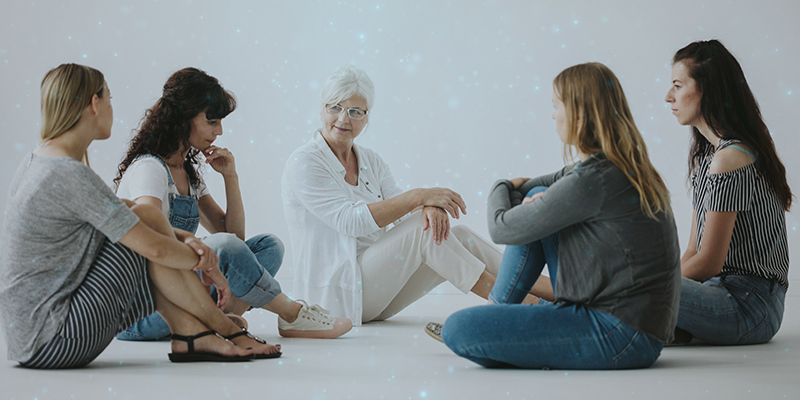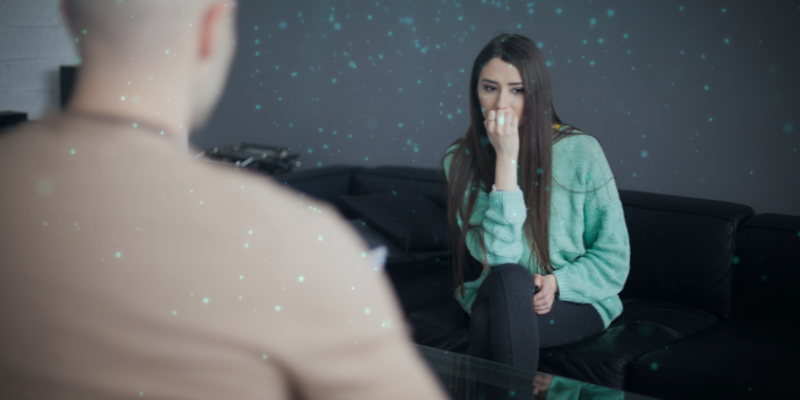
Feeling anxious? Panicky? Fearful? Welcome to the club. Anxiety disorders are the most common mental health condition in America. Each year, an estimated 40 million American adults—over 18% of the population—experience anxiety, and those are pre-pandemic numbers! The rate of anxiety is skyrocketing. A review of recent studies on mental health and the pandemic show that the prevalence of anxiety is now 32%.
If you head to a traditional healthcare provider and tell them you’re experiencing anxiety, you’re likely to walk out with a prescription for anti-anxiety pills. End of story. But there’s so much more you need to know.
9 Need-to-Know Facts About Anxiety
1. Your anxiety may be a family heirloom.
If you have family members who suffer from anxiety, you have a higher risk of developing it too. Both nature (genetics) and nurture (behavior) play a role in this phenomenon. Studies on identical twins and within families have shown the high genetic nature of many mental health issues. According to research, the familial risk of anxiety disorders is:
- Identical twins: 40%
- Siblings: 25%
- General population: 6%
A 2014 study in the journal Translational Psychiatry found that the α-endomannosidase gene (MANEA) was associated with panic disorder and social anxiety disorder. In terms of nurture, parents tend to model anxious behaviors that children emulate. In addition, research in Child Psychiatry & Human Development shows that parents with social anxiety disorder demonstrate less warmth/positive effect with their children, give them more criticism, and have more doubts about their child’s competency than non-anxious parents. It’s likely that rubs on kids.
Chill out: Having a genetic risk is not a death sentence; it should be a wake-up call for you to know your vulnerabilities and get serious about taking care of your brain. Genes load the gun; your behavior and environment pull the trigger.
2. Your anxiety may be related to thyroid problems.
An overactive thyroid produces too much hormone, making everything in your body work too fast. It can feel like you’re in hyper-drive—you feel jittery and edgy, as though you’ve had way too much caffeine. Statistics show overactive thyroid is associated with anxiety, depression, restlessness, and psychosis and affects about 1 in every 100 people in the U.S.
Chill out: Get your thyroid tested and balance it if needed. Take nutraceuticals that support thyroid function, including L-tyrosine, zinc, iodine, and ashwagandha.
3. Progesterone imbalances may be contributing to your anxiety.
Progesterone, which plays an important role in a woman’s monthly cycle, is like nature’s anti-anxiety pill. Progesterone influences more than just a woman’s reproductive system. It has a high concentration of receptors in the brain, and it helps support the neurotransmitter GABA, which helps the brain relax. That’s why it’s often called the “relaxation hormone.” When it is in balance, it calms you, brings feelings of peacefulness, and promotes sleep. When there’s a hormonal imbalance, calmness can give way to anxiety, irritability, depression, sleepless nights, and brain fog. In a woman’s late thirties and forties, major fluctuations in progesterone can make you feel anxious and out of sorts.
Chill out: Get your progesterone levels tested and consider hormone therapy if necessary. Nutraceuticals that support progesterone production include chasteberry.
4. Not all anxiety is the same.
Brain SPECT imaging studies show that anxiety disorders (including social anxiety disorder, panic disorder, and phobias) are not single or simple disorders. Over 160,000 brain scans at Amen Clinics have shown that there are 7 types of anxiety. Giving everyone who’s anxious the same treatment will never work. Knowing your type is the key to getting the right treatment plan.
Chill out: Consider getting a brain scan to discover your anxiety type and read more about the 7 types of anxiety.
Brain SPECT imaging studies show that anxiety disorders (including social anxiety disorder, panic disorder, and phobias) are not single or simple disorders. Over 160,000 brain scans have shown that there are 7 types of anxiety. Click To Tweet5. Anti-anxiety medication can be bad for your brain.
Most mental health professionals never look at the brain, so they wouldn’t know that anti-anxiety pills (such as benzodiazepines) negatively impact brain function. SPECT scans show that people who take benzos for anxiety tend to have decreased brain activity and a toxic-looking brain. People who take benzos also find it very hard to stop taking them.
Chill out: Be cautious about starting any medication that may be hard to stop. Try natural solutions to heal anxiety, such as these 12 Alternatives to Anti-Anxiety Pills.
6. Oral contraceptives may contribute to anxiety.
You may already know that hormonal birth control pills have been shown to cause problems with blood pressure and blood clots and increase the incidence of strokes, especially if you smoke or have a history of migraine headaches. But did you know that oral contraceptives also affect your brain and mental health? Research in Frontiers in Neuroscience shows that taking the pill causes structural changes in the brain, alters neurotransmitter function, and messes with mood regulation. Stopping the pill isn’t necessarily a quick-fix solution. In the months following cessation of hormonal birth control, some women experience a rash of symptoms, including anxiety, mood swings, and depression. Some hormonal experts have started calling this effect “post-birth control syndrome.”
Chill out: If you’re taking oral contraceptives or have stopped taking them and are experiencing symptoms, seek professional help.
7. What you put on your fork matters.
The foods you eat can either help you feel calm and relaxed or can ramp up anxiousness and stress. Research in the American Journal of Psychiatry found that people who ate more vegetables, fruit, fish, meat, and whole grains were less likely to feel anxious than those who ate a typical Western diet high in processed and fried foods, sugary items, refined grains, and beer.
Chill out: Avoid foods that spike anxiousness and try these 8 Anti-Anxiety Foods You’ll Love.
8. Killing the ANTs (automatic negative thoughts) can help.
Every time you have a thought, your brain releases chemicals that affect how you feel. Anxious and worried thoughts make you feel bad; happy and hopeful thoughts make you feel good. Thoughts can be automatic, and it’s the ANTs (automatic negative thoughts) that make you feel stressed, nervous, and anxious. Learning to eliminate the ANTs can help calm your nerves and keep you feeling relaxed. To kill the ANTs, notice whenever you have a negative thought and talk back to it. You don’t have to believe every negative thought you have!
Chill out: Learn to kill the ANTs.
9. Some anxiety is good.
You may think anxiety is awful, but it isn’t all bad. In fact, it’s important to have a healthy level of anxiety. It’s what keeps you from engaging in death-defying feats, making poor decisions, or investing all your money in a pyramid scheme. Studies show that people with a “don’t worry, be happy” attitude tend to die earlier from risky behavior.
Chill out: Try to embrace the good side of anxiety while keeping it from interfering with your everyday life.
Anxiety, panic disorders, phobias, and other mental health conditions can’t wait. During these uncertain times, your mental well-being is more important than ever, and waiting until life gets back to “normal” is likely to make your symptoms worsen over time.
At Amen Clinics, we’re here for you. We offer in-clinic brain scanning and appointments, as well as mental telehealth, remote clinical evaluations, and video therapy for adults, children, and couples. Find out more by speaking to a specialist today at 888-288-9834. If all our specialists are busy helping others, you can also schedule a time to talk.





Until you have lived with it, you will never truly understand it.
Comment by Kathleen Kennedy — November 2, 2020 @ 3:55 AM
what does brain spect cost? Sounds like a helpful tool!
Comment by Rebecca lillemon — November 2, 2020 @ 4:16 AM
After a few years in semi-retirement I am re-entering the Mental Health field. I am a Licensed Mental Health Counselor in the State of HAWAII & I find your articles helpful in getting my mind re-oriented to the mental health field. I have enjoyed the last two, in particular, on signs to look for in children for underlying mental health conditions & this one on anxiety. I do not know how I came across AMEN CLINICS but PLEASE keep up the good work!
Comment by Michael Quay — November 2, 2020 @ 4:44 AM
After my second or third chemotherapy session in 2013, I started having panic attacks. They diminished some, but have increased in the last couple years. Am I correct in thinking that chemo is the cause, or at least a contributing factor?
Comment by Linda — November 2, 2020 @ 6:00 AM
Thank you, Dr. Amen for your research.
I developed extreme anxiety/panic attacks after a breast Explant surgery in 2016. Doctors can’t tell me why or help me. Just benzos. I was having the kind of panic attacks that ‘side swipe’ you. Night & day. I didn’t have to be thinking about anything. It has been relentless for the last four years. I would love to know if you have had much success w/such extreme anxiety?
Comment by Debbie — November 2, 2020 @ 10:29 AM
Please offer solutions for insomnia in 50year olds. Nothing has ever worked! Are there causes or treatments savvy well read people like me may not have tried?Thank you. Love your info-greatly appreciated by countless people!
Comment by Carol — November 2, 2020 @ 1:01 PM
I agree with those facts about anxiety my 21 year old son have been put on so many medications including benzodiazepines and his anxiety issues have been so much worse for months and months.
Comment by Donna Renouf — November 2, 2020 @ 3:36 PM
When a SPECT scan is used to determine the type of anxiety, is it able to determine if the anxiety is due to hormones versus genetics versus medications etc? Thanks
Comment by Kris — November 2, 2020 @ 4:59 PM
Hello Kris, thank you for reaching out. SPECT scans are a diagnostic tool that we use with each patient in order to determine their specific levels of blood flow and activity in their brain and thus we can determine the best courses of treatment. We also collect a detailed history of information from each patient, and we can certainly factor in genetics as well as issues related to hormones and medications. Here is some information on our process with our patients: https://amenclinics.com/approach/amen-clinics-method/. We have an integrative medicine program at our clinics (https://amenclinics.com/services/integrative-medicine/) as well as many alternative and holistic treatment methods (https://amenclinics.com/services/). For more information, please contact our Care Coordinators here: https://amenclinics.com/schedule-visit/.
Comment by Amen Clinics — November 5, 2020 @ 10:16 AM